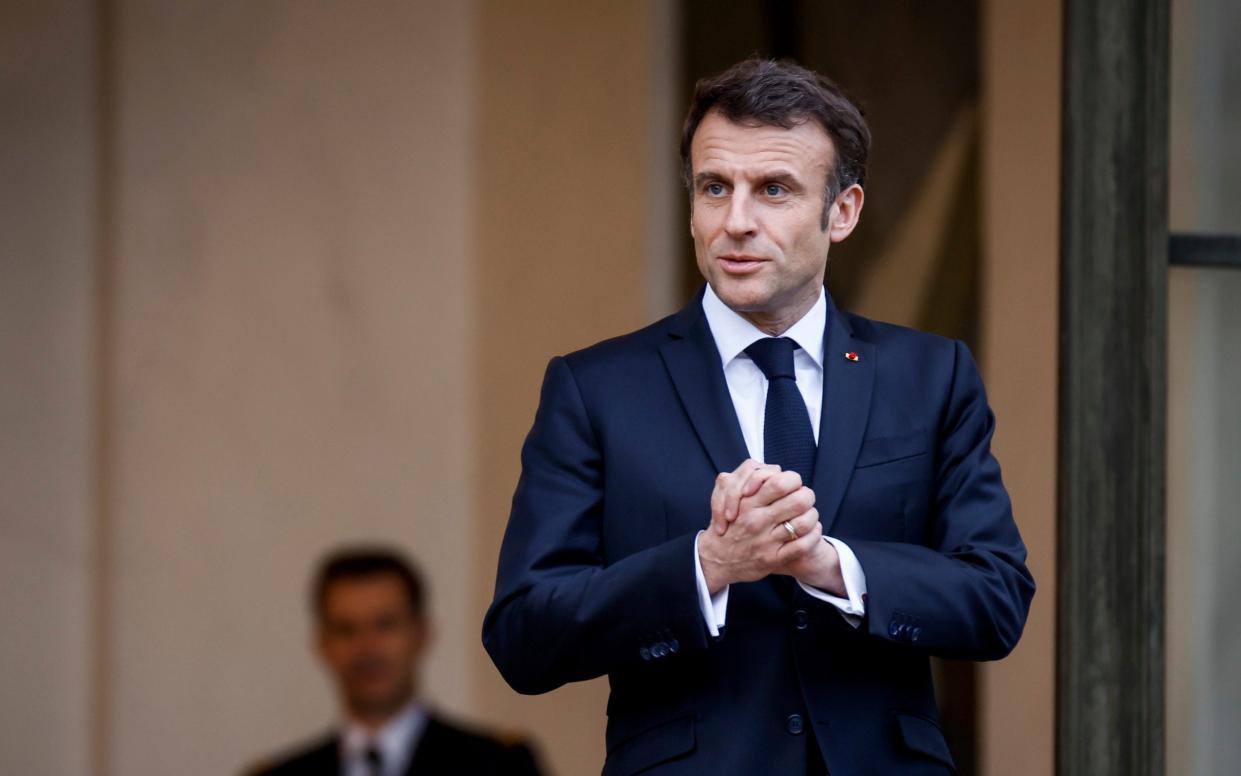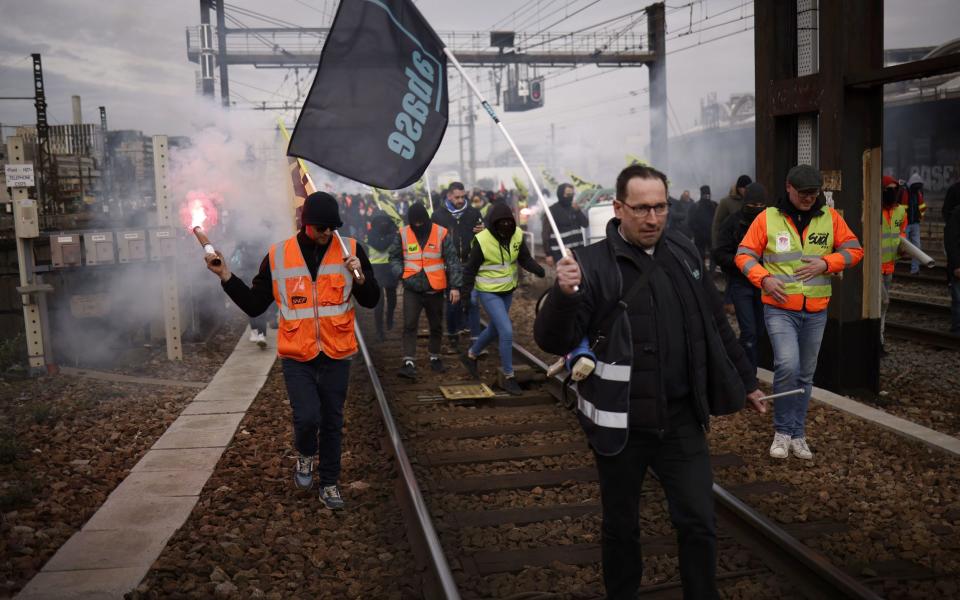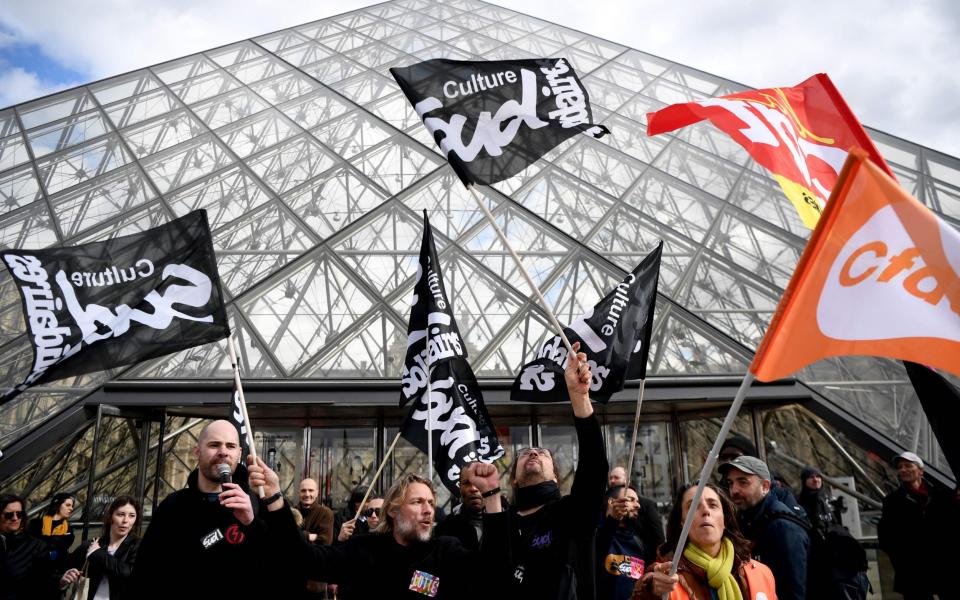Emmanuel Macron's popularity plummets as his country burns

Emmanuel Macron’s popularity has dropped to its lowest since the Yellow Vest movement, as banks were set on fire amid fresh clashes with police during protests against the French president’s pension reforms.
On the 10th national day of strikes and protests in France, support for Mr Macron was close to the 27 per cent low reached in December 2018 when the Yellow Vests demonstrations rocked his government.
Only 30 per cent of people thought he was a “good president”, down by six points in a month, according to the Odoxa poll published as Mr Macron continued to defy unions and the millions who have opposed his pensions Bill since mid-January.
Seventy per cent of respondents judged him negatively in the survey for regional newspapers published nearly a fortnight after he rammed through a new pensions law raising the retirement age from 62 to 64 without a parliamentary vote.
Public frustration has evolved into broader anti-Macron sentiment. Banners were hoisted reading “the king is dead” and “raise wages not the retirement age”, as the march of tens of thousands of people in the capital began.
“The Bill has acted as a catalyst for anger over Macron’s policies,” 31-year-old Fanny Charier, who works for the Pôle Emploi office for job seekers, said at the rally.
Record numbers of security forces were deployed across France after last Thursday’s pitched battles with demonstrators on the streets of Paris.
Thirteen thousand members of the security forces, including 5,500 in Paris alone, were deployed after 457 arrests across France and 441 police officers were injured last Thursday before marches expected to attract a million marchers.
They will be supported by armoured cars, water cannon, and military units in reserve, amid fears the protests could be hijacked by anarchist groups just days after a state visit by King Charles was cancelled because of the violence.
“Radicalised elements from the Left and the ultra-Left want to hijack the trade union processions,” said Gérald Darmanin, the interior minister. “Their aim is to bring fire and blood to France,” he added.
The most feared group is the Black Bloc – an alliance of anarchists from all over Europe, who are expected to be out in force for the demonstrations.
Raphael Dupont, 49, an out-of-work former air steward, said: “The Black Blocs will soon be here. They generally spring out from side roads at the front of the line or suddenly change clothes.
“They attack banks and other signs of capitalism. I’m against violence but note that this government is so deaf it may be the only thing that works.”
Earlier on Tuesday, the government rejected a new demand by unions to suspend and rethink the pension Bill. It said it would talk to unions on other topics but stand firm on pensions.
Mr Macron, who promised to deliver pension reform in both of his presidential campaigns, says change is needed to keep the country’s finances in balance.
“We have proposed a way out ... and it’s intolerable that we are being stonewalled again,” Laurent Berger, the head of the CFDT union, said at the start of a rally in Paris.
In Paris, protesters delayed trains at the Gare de Lyon station. They walked on rails and lit flares in a show of solidarity for one railway worker who lost an eye in a previous protest.

The Eiffel Tower was closed after the Louvre, the world’s most visited museum, was shut after workers blocked entry to it on Monday.
Rolling strikes in the transport, aviation and energy sectors continued to disrupt travel.

However, in a move bringing some relief for Parisians and tourists alike, city garbage collectors said they were suspending their weeks-long strike that has left the roads around famous landmarks strewn with piles of trash.
In Nantes, western France, protesters threw projectiles at security forces who responded with tear gas.
The boarded-up front of a BNP Paribas bank branch was set on fire. A car was set on fire in the margins of the rally, as well as rubbish bins, while some shot fireworks at police and protesters blocked roads into the city, causing traffic jams.
Clashes also broke out in Rennes, also in western France, and a flashpoint in last week’s demonstrations, according to AFP.
Dressed in black, 350 young people destroyed shop windows before police used water cannons and tear gas after a demonstration of 13,600 people in the city.

 Yahoo News
Yahoo News 
